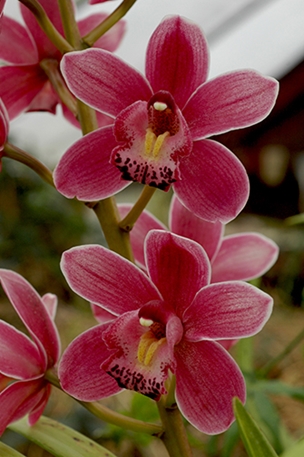"Do Not Fertilize in Winter" applies to orchids, too

.
Does the 'do not fertilize house plants' suggestion also apply
to Cattleya orchids? I have always fertilized them "weakly
weekly" as the orchid societies suggest. I summer mine outdoors and
have lots of flowers forming right now. They do not get extra
light, but are in south facing windows.
- C.D. -
You are missing four words from that good rule. It goes "Weakly
weekly while in active growth." Orchids require a rest
period of drier, cooler time and most take it in winter. Then
they're "on hold", even if a flower stalk has made its appearance.
Fertilizer then does no good so it's a wasted resource and can
accumulate to burn and weaken roots. It may also cause long, weak
growth in leaves or leaf tip dieback.
However, no one tells Ma Nature these rules. Where orchids grow
wild, attached to tree limbs and rocks, they get their nutrients
from organic sources such as bird droppings. Perhaps guano decays
into soluble form more slowly during the orchids' resting period,
since that rest tends to coincide with a dry, cool season. That
might keep the nutrient flow in check, but we doubt the birds
wait!

Orchid grower's formula
Ron Ciesinski of Taylor Orchids in Monroe, Michigan grows
thousands of orchids and is just about to quit fertilizing most of
them until March. "They don't grow in winter, even under lights.
When they start growing again, usually in March, I use a high
nitrogen fertilizer. Then once the new leaves are formed I switch
to one with lower nitrogen, such as 6-30-30 and keep that up into
fall."


Orchids are pretty, and fertilizer can help bloom size and
color. However, the plants can't use fertilizer in winter when they
are dormant, no matter how leafy, and not even if they have
initiated flower stalks.
